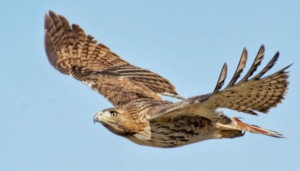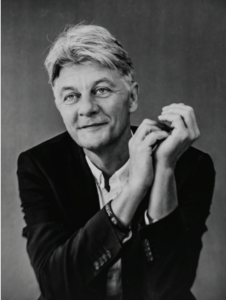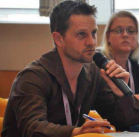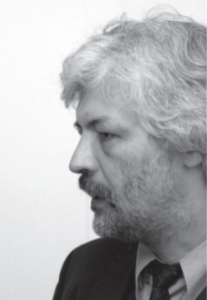Plàcid Garcia-Planas has been
a reporter for the Barcelona
newspaper ‘La Vanguardia’
since 1988. He has covered the
disintegration of Yugoslavia,
the two Gulf wars (1991 and
2003), as well as the conflicts in
Lebanon, Libya, Israel-Palestine,
Iraq, Afghanistan and Ukraine.
Among his books, the most
outstanding is ‘The Marquis and
the Swastika. César González
Ruano and the Jews in occupied
Paris’, an investigation – written
together with Rosa Sala Rose –
that caused the disappearance of
the most prestigious journalism
award in Spain.
We humans vomit on vultures, arrest them as spies in the Middle East, and
give their names to killer helicopters in Ukraine. We project our own
mental and geopolitical darkness onto them.
Today is International Day of the Vulture.
Yesterday was the day of the art of searching for fingerprints at the crime
scene to catch the murderer, Fingerprinting, and tomorrow will not be the
international day of anything – let us relax – until Monday they return to
the fray with the day of Sexual Health.
But today, like every first Saturday in September, the world celebrates the
angel who feeds on dead bodies. The Day of the Beast.
The most brutal thing about the only vulture I have seen up close, in the
Kabul zoo, was the cage where we humans kept it. And I have not found
the most brutal scavengers in Afghanistan or Ukraine. I have seen them,
also very close, in Paris.
In 2014, taking advantage of the fact that I was in the City of Light to cover
the largest arms fair in the world, I went to the Louvre. It was the
centenary of the First World War and I wanted to see the Stele of the
Vultures, the first war chronicle in history. Carved in stone, it narrates in
images a Sumerian war from the year 2450 BC: mass burials of corpses,
humans sticking spears into the skulls of other humans, kings crushing the
heads of their prisoners with a mallet and vultures nibbling on human
remains.

The scavengers, that June, were not just carved in stone. Since the
beginning of time, their hearts beat, and in Paris they flew over the stands
of the arms fair: one hundred years after June 1914 – when Gavrilo Princip
murdered the heir to the Austro-Hungarian crown in Sarajevo – I
discovered that the (Belgian) manufacturer of the handgun that fired the
first bullet of World War I is still making handguns today.
Vultures don't make handguns, and humans project their own darkness
onto them. Ukrainians call the fearsome Russian Ka-52 helicopters Putin's
vultures, and out of pure geopolitical projection we arrest vultures for
freely crossing the sky.
The Lebanese detained one that flew in with a tracking device on its paw.
UN peacekeepers had to intervene: the vulture came from an Israeli
nature reserve, and the device was conservationist.
That same year, 2016, another vulture, a Bulgarian, flew over Turkey,
Syria, Jordan and Saudi Arabia to end up arrested in Yemen. Bulgarian
diplomacy mobilized to clarify that the “espionage” was only
environmentalist. A few years earlier, an Israeli vulture was arrested in
Saudi Arabia with a transmitter and a bracelet on one leg with the words
Tel Aviv University. The Saudis insisted it was a Zionist vulture because the
animal was captured near a sheikh's mansion.
“A person who takes advantage of another's misfortune,” this is how the
dictionary of the Royal Spanish Academy defines the term vulture as a
second meaning. We humans accuse vultures of what we are. Because,
unlike humans, who kill for the sake of killing, vultures almost never kill
the animals they eat, even though they are the only terrestrial vertebrates
that depend almost entirely on dead bodies for food.
Unlike humans, who devour the ecological balance of the planet like
“vultures”, vultures without inverted comas are true wizards of that
balance. They reduce the number of smelly corpses on the ground, and
the strong acid and two bacteria that nest in their stomach eliminate
toxins and microbes from the decomposing meat they ingest, preventing
the spread of disease.
We humans poison, vomit putrefaction into the food chain, and vultures
clean up. They clean us. They do nothing more than remove the
abandoned putrefied matter to offer it, recycled, to the chain of life.
Their stomach acid ends up making us high. It is the incense of “celestial
burials”, an ancient funerary practice still widespread in Tibet, Sichuan,
Qinghai, Mongolia, Bhutan and in parts of India: the body of the person
who has died is stripped, his hair is shaved and – before the family, or not
– the corpse is dismembered with a knife. And the remains are placed on
an elevation so that the vultures can eat them. The bones too, previously
crushed. It is impossible to find a more forceful spiritual expression of the
food chain: you do not ascend to heaven until the vultures have ingested
all the meat – and bones – of your body.
Vultures fly towards the light and “vultures” plummet towards the dark
side: in 2011, Russell O. Bush denounced in the documentary Vultures of
Tibet the emergence of tourism in these excarnation rituals. In Tibet alone
there are two thousand altars registered. The orcs reducing to morbidity a
very pure – for us disturbing – way of communing with the cycle of
existence.
Everything is brutally certain in these burials by elevation, and everything
is brutally uncertain in a humanity that is not clear where the Beast ends
and Beauty begins, who has one week left to be queen: next Saturday is
the International Day of Beauty (an initiative of the Russian section of the
International Committee of Aesthetics and Cosmetology).
Without lipstick, with their imposing external and gastrointestinal beauty,
vultures elevate us more than any other living being. On November 29,
1973, a commercial plane hit a bird in the vertical of Abidjan, Ivory Coast.
Of the animal – engulfed by one of the plane's turbines – only five
complete feathers and fifteen partial feathers remained from the wings,
tail, neck and chest. Enough to confirm that it was a spotted vulture.
It is the highest flight ever recorded by a living being: eleven kilometres in
altitude. More than Mount Everest.
It was like an angel hit by a Boeing.







